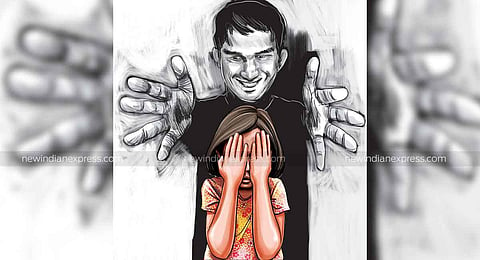

CHENNAI: Ahead of the Assembly elections 2021, women’s safety has once again become a hot topic among politicians. DMK President MK Stalin on Thursday lashed out at Uttar Pradesh Chief Minister Yogi Adityanath for accusing his party of not safeguarding women during its regime, adding he had no moral right to say so. Meanwhile, the ruling government prides itself as the government that is most 'women friendly'.
While politicians bicker about who protects women better, fieldworkers argue that various parties’ manifestos on women’s safety and security are still rooted in the patriarchal ethos. Experts said that political parties’ policies on women’s security have been largely drafted by men and not women.
The benevolent patriarchy
Sujata Mody, president of Urimai Kural’s Pen Thozhilalar Sangam, points out that men who draft the policies assume that women do not want to be equal partners in development ultimately leading to the culture of “freebies” in Tamil Nadu. Take grants for household women, promised by MNM, DMK and AIADMK. “The schemes essentially monetise household labour. The parties fail to see that women would rather have shared labour at home. There are no meaningful steps to change men’s involvement in household affairs or ensuring women’s safety indoors,” she adds.
According to government data, majority of crimes against women are perpetrated by people they know and it happens indoors at home or at workplaces. Yet majority of the policies look at women's safety as
something that is threatened mostly on the streets.
Mody emphasised that many schemes have been transferred by subsequent governments without introspection, such as the popular gold-for-marriage scheme, which was conceived to prevent dowry harassment. The scheme itself is a symbol that all governments have accepted their failure in enforcing and implementing laws that prevent child marriage and dowry harassment.
“Women’s security is not just protecting women; it is about setting an example that crime against women will be prosecuted,” said Chennai-based social historian and activist V Geetha, who writes extensively on gender issues. She added that the proposed policies also do not address the issue of social inequality that leads to gender-based violence among women from Dalit and other marginalised
communities. While considering the gold-for-marriage scheme to address women's safety indoors Geetha said, “Even if the government promises a large quantity of gold and money, it will not help because the money does not reach them at all. It is the woman's or the groom's family that has power over that gold.” She said what really helps women's safety is safe working conditions which gives them financial
independance.
Infrastructural safety
Mody, who agrees with this, opines, “Women want to get equal wages and better employment opportunities. That will subsequently reduce their vulnerability in the workplace. Transport facilities should be strengthened to make them more accessible to the larger female population.” She said that a safe transport system is crucial for women’s safety as men often survive flexible timing, but women lose out on good employment if their workplace is too far away or their journey is unsafe.
In this regard, the subsidy for bus passes and exclusive women’s transport helps. Safe access to toilets, open workspaces where women are not confined in corners and a fool-proof mechanism to address workplace harassment, among other crucial issues, are amiss from party promises.
Tara Krishnaswamy, co-founder of ‘Shakti - Political Power To Women’ a public pressure group, says, among the infrastructural promises made to improve women’s safety, the one that works is deploying police patrol vehicles that specifically look out for crimes against women. She says that CCTVs and safety apps like Kaavalan, don’t have a huge impact.
CCTV and the technological dilemma
After a dramatic surge in CCTV installations in cities during this term, the ruling government has promised to boost CCTV installation drive in tier-II cities too. The BJP contestant Khushbu Sundar too has said that she plans to boost women's safety by installing CCTVs everywhere. But do CCTV's really prevent crimes against women? However, Krishnaswamy answers, “CCTVs have nothing to do with women, it is to do with crimes. It does not prevent it. It may, at best, help catch the culprit in some cases.”
She said that selling anything that helps solving general crimes cannot be considered as something that improves women's safety. She added that women often report harassment long after the incident happens owing to stigma. "CCTVs do not store data recorded months before. So it only helps solve a few crimes against women after it has happened," Krishnaswamy asserts.
She also said that apps like Kaavalan are helpful, but only to upper middle class or rich women in cities. "The ratio of women who own smartphones compared to men is low and the rate of women who own smartphones is even lower. The proportion of women who will have a data pack recharged on their smartphone during a crime is very low," she said, adding that having the eyes of police and other women on the street are the most effective against harassment in public places.
Strengthening existing system
Prasanna Gettu, co-founder of the Chennai-based International Foundation for Crime Prevention and Victim Care (PCVC) said that party manifestos promise random solutions which will not be effective. “What we need is to identify the gap in the existing system and fix that,” she said.
Taking DMK's promise to set up courts in every district to address women's issues, as an example she said that Tamil Nadu already has Mahila Courts which do not function smoothly. “The government has to analyse what crimes are on the rise against women and address them specifically every election,” she said.
She added that with installing CCTVs and giving gold for marriages, the onus of women's safety continues to be on women; with politics contributing little to educate and sensitise the public. "Ending violence against women starts with ensuring gender equality. Without it, safety concerns can only be mitigated marginally," she said.